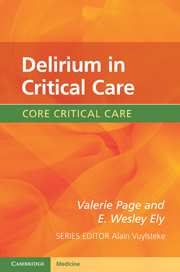Book contents
- Frontmatter
- Contents
- Foreword
- Delirium, a patient testimony
- 1 What is delirium in critical care?
- 2 How common is delirium in critical care?
- 3 What does delirium look like in critical care?
- 4 Delirium in critical care: how does it happen?
- 5 Delirium: what causes it? Risk factors
- 6 Delirium in critical care: why is it important?
- 7 Delirium in critical care: how do we diagnose it?
- 8 How to prevent delirium?
- 9 Treatment of delirium in critical care
- 10 Mental capacity and restraints
- 11 End-of-life care
- 12 What is the future?
- Selected references
- Index
- References
6 - Delirium in critical care: why is it important?
Published online by Cambridge University Press: 05 December 2011
- Frontmatter
- Contents
- Foreword
- Delirium, a patient testimony
- 1 What is delirium in critical care?
- 2 How common is delirium in critical care?
- 3 What does delirium look like in critical care?
- 4 Delirium in critical care: how does it happen?
- 5 Delirium: what causes it? Risk factors
- 6 Delirium in critical care: why is it important?
- 7 Delirium in critical care: how do we diagnose it?
- 8 How to prevent delirium?
- 9 Treatment of delirium in critical care
- 10 Mental capacity and restraints
- 11 End-of-life care
- 12 What is the future?
- Selected references
- Index
- References
Summary
Introduction
Delirium is common, especially in vulnerable elderly patients or the seriously ill, it often goes unrecognized and the pathophysiology is still unclear. So what? This chapter is all about the ‘so what’, the adverse outcomes associated with delirium. Delirium is not benign.
Often the question is ‘are patients dying with delirium or because of delirium?’ This chapter will show that both statements are true.
Severity and duration of delirium
In general, it is thought that the degree and duration of delirium will have an impact on outcomes. So patients who develop subsyndromal delirium will have better outcomes than those who meet the full criteria. This is true for both elderly medical patients and patients in intensive care. Those patients who recover from full-blown delirium before discharge will fare better than those who are admitted to rehabilitation hospitals with prevalent delirium.
This suggests that aggressively managing an episode of delirium in patients with a view to reducing the duration is a good idea; secondly that persistence of symptoms in a patient up to discharge needs to be followed up.
But as often, the evidence (scientific or statistical) is lacking… and studies are much needed!
Persistent delirium
Traditionally it has been thought that delirium is a temporary state and self-limiting even if it is not treated pharmacologically. However, as referred to in Chapter 2, some patients never recover completely and continue to demonstrate symptoms of delirium up to and following discharge.
- Type
- Chapter
- Information
- Delirium in Critical Care , pp. 94 - 108Publisher: Cambridge University PressPrint publication year: 2011

